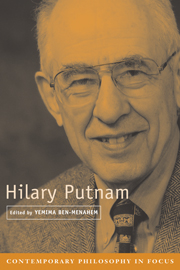Book contents
- Frontmatter
- Contents
- List of Contributors
- Acknowledgments
- 1 Introduction
- 2 Putnam's “The Meaning of ‘Meaning’”: Externalism in Historical Context
- 3 The Face of Perception
- 4 Realism, Beyond Miracles
- 5 Putnam on Skepticism
- 6 The Tale of Quantum Logic
- 7 Another Philosopher Looks at Quantum Mechanics, or What Quantum Theory Is Not
- 8 Structural Realism and Contextual Individuality
- 9 The Rise and Fall of Computational Functionalism
- 10 The Pragmatic Turn: The Entanglement of Fact and Value
- Index
- References
1 - Introduction
Published online by Cambridge University Press: 08 January 2010
- Frontmatter
- Contents
- List of Contributors
- Acknowledgments
- 1 Introduction
- 2 Putnam's “The Meaning of ‘Meaning’”: Externalism in Historical Context
- 3 The Face of Perception
- 4 Realism, Beyond Miracles
- 5 Putnam on Skepticism
- 6 The Tale of Quantum Logic
- 7 Another Philosopher Looks at Quantum Mechanics, or What Quantum Theory Is Not
- 8 Structural Realism and Contextual Individuality
- 9 The Rise and Fall of Computational Functionalism
- 10 The Pragmatic Turn: The Entanglement of Fact and Value
- Index
- References
Summary
In many ways Hilary Putnam's writings constitute the ideal introduction to his thought. For they are not only lucid and accessible, but also self-reflective, providing numerous signposts to his philosophical motivations, changes of mind and sources of inspiration. Rather than simply ‘introducing’ Putnam's thought, therefore, the papers collected here are mostly interpretative, seeking, in particular, to trace changes in the broader philosophical environment Putnam's thought was part of – changes that in many cases were precipitated by his novel ideas – and chart the transformation of Putnam's own thinking against the background of these developments. In tracing the evolution of Putnam's thought, they provide a window onto the dynamics of the Anglo-American philosophical arena since Putnam's emergence, in the 1960s, as a leading philosopher. One such transformation is the demise of logical positivism, still dominant in Putnam's formative years, and a growing interest in Wittgenstein and American pragmatism. A related trend is the shift away from the philosophy of science, which loses the primacy it enjoyed in the 1950s and 1960s, and the corresponding repositioning of the philosophy of mind, which takes its place. Most significant, perhaps, is the increasing salience of the ethical perspective in the wake of the growing desire that philosophy play a more direct role in our lives.
Putnam, who has always been politically engaged, never distanced himself from the ethical. Professionally, however, he was educated in analytic philosophy at a time when it tended to relegate ethical and existential issues to the sidelines.
- Type
- Chapter
- Information
- Hilary Putnam , pp. 1 - 16Publisher: Cambridge University PressPrint publication year: 2005
References
- 1
- Cited by



